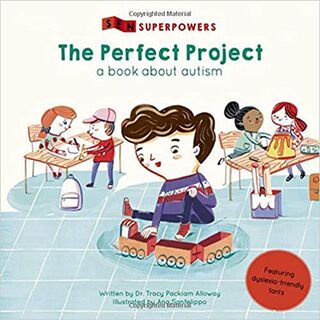Memory
An Autism Memory Superpower
Let's celebrate some strengths during Autism Awareness/Acceptance Month.
Posted April 19, 2022 Reviewed by Gary Drevitch
Key points
- Some students with autism have above average verbal memory, while others experience memory difficulties.
- Visual memory can be weak in some students, making it hard for them to detect social cues in the classroom and on the playground.
- Declarative memory, or memory for facts and events, is often very strong in children with autism.

As a psychologist and a researcher who has dedicated her research career to understanding learning needs, I wanted to create a book series to demonstrate how the brain works in children with learning needs and to shift the focus to celebrating their strengths. It is easy to focus on their learning needs and miss the many ways in which their brains are unique and give them an advantage in other areas.
My children’s book series, the SEN Superpowers series celebrates the positive traits associated with a range of common SEN (Special Education Needs) conditions, aiming to boost the confidence and strength-awareness of children with these conditions, while also allowing for better understanding and positivity among their peers.
The book, SEN Superpowers: The Perfect Project, celebrates the superpowers of autism as Charlie’s class has to do a class project on trains, and he uses his abilities to help his group get the job done. (Each book includes a page of discussion points about the story, tips for how to boost abilities — inclusive for children with and without special educational needs, and a page of notes for parents and teachers.) The characteristics of a child with autism highlighted in this story include:
- Language. Individuals with autism often have a literal understanding of language, which makes it difficult for them to understand colloquial expressions (like “lend a hand”). This can result in frustrations in social situations because they don’t always realize that language can be used in a flexible or creative way.
- Emotions. Children with autism can find it difficult to express their emotions. So they may repeat phrases they have to communicate what they feel, which is known as echolalia.
- Memory. Autism is a spectrum condition, which means that each individual's working memory profile can vary. Some students with autism have above-average verbal memory, while others may experience memory difficulties. Visual memory can be weaker in some students, making it hard for them to detect social cues in the classroom and in the playground. However, declarative memory — our memory for facts and events — is often very strong in children with autism. This powerful memory system can help them memorize not just interesting facts, but also rules to help them navigate social situations.
- Sensory Overload. Students with autism may have good working memory but struggle to use it when they experience sensory overload due to loud noises, odd smells, or even certain lights. This can make it difficult for them to concentrate in crowded or noisy places.
3 Tips for Boosting Memory Skills
Here are some handy tips for boosting memory skills to help children get the most out of their superpowers:
- List it. This fun game can increase how quickly children remember things because it keeps the link from our working memory to our long-term memory active. In 10 seconds, list as many vegetables as you can. Try it again, this time with fruits, colors, names, etc.
- Learn before snoozing. If children struggle to remember information before a big exam, encourage them to revisit it before they go to sleep. Studies show that learning just before bedtime can help your memory store all the information safely and allow you to remember it better.
- Draw it. Studies show that just 20 minutes of drawing can boost working memory. So encourage children to grab a blank piece of paper and some coloring pencils and have fun.


